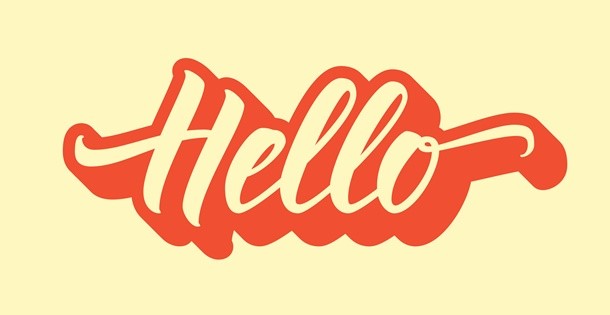Saying hello to someone seems like a mundane thing to do, but sometimes that simple greeting can be the first step toward greater communication and understanding. In 1973, this basic truth was recognized by Michael and Brian McCormack, who mailed 1,360 letters in seven languages to world leaders and government officials to encourage them to participate in the first ever World Hello Day on November 21.
Their campaign was a reaction to the armed conflict between Israel and a coalition of Arab states that had inflamed the Middle East that October. The McCormack brothers hoped to create and promote World Hello Day to remind world leaders of the importance of personal communication for peace, and that they should rely on communication, not force, to resolve their conflicts.
The idea caught on and stayed on; November 21, 2017, marks the 45th World Hello Day.
There are no grand ceremonies or complex traditions for celebrating the day; just make a point of saying hello to at least 10 people, recognizing as you do so the importance of personal communication for mutual understanding and respect.
Just Getting Your Attention
Hello is a greeting that is understood almost everywhere in the world, but it hasn’t always been so. In fact, hello is a relatively young word, dating only back to 1827 according to the Oxford English Dictionary.
Before that, all the way back to the Middle Ages, hail was a common English greeting. (The word is related to health, so it was not only a salutation but well-wishing.) Through the combination of dialects, accents, and the lack of an authority on English spelling, a number of variants of hail developed over the centuries, including hollo and hallo. But even into the 19th century, these words weren’t used as greetings, but to indicate surprise or to attract someone’s attention — much in the same way we use hey and yoo-hoo today.
We can find that usage in the early issues of the Post. This little bit of wordplay appeared, without a byline, in the September 2, 1826, issue:
Capt. — Tom, hand that lady into the boat.
Lady. — O dear I’m as giddy as a goose.
Capt. —Then I’d have you take care, ma’am, you don’t make a duck of it.
’Squire Lollypot— Hallo, there, catch that wail.
Jo. Strickland. — Where? where? Darn me if I wuddent give a hundred dollars to see a whale; I never see wun in my life.
’Sq. Loll. — I begs your pardon, sir; you didn’t hunderstand my meaning; hit’s my vife’s wail, vat she wears hover her vig.
Answering the Phone
Hello began catching on as a greeting through the 19th century, but it wasn’t until the telephone was invented that its future was sealed. A mythology even developed around the connection between phones and hello. One story says that Thomas Edison, whose exploits are often exaggerated, invented the word hello from whole cloth. (He didn’t.) Stranger is the story that telephone inventor Alexander Graham Bell chose hello as a phone greeting because it was the name of his girlfriend, one Margaret Hello. (She never existed — Bell developed the telephone while he was engaged to Mabel Hubbard, and she would be his wife until his death in 1922.)
Though the primary players in those stories are correct, the truth isn’t so provocative. After Bell patented the telephone in 1876 and the technology began to spread, he recommended that users begin a call by saying “ahoy,” a common nautical greeting for more than a century; he answered his phone like that for the rest of his life. Thomas Edison, on the other hand, thought “hello” was a better choice.
When the first telephone book was printed in New Haven, Connecticut, in 1878, it included a “how to” section as well as tips on phone etiquette, including that one should initiate a telephone conversation with “a firm and cheery ‘hulloa.’” By 1880 Edison’s preferred hello had won out.
It isn’t difficult to see why, either. For many land-bound Americans, the nautical ahoy would have been awkward or even unknown. Hello had been gaining popularity around the country over the preceding 50 years and so would have come more naturally to many.
Hello had become such a widespread lexical innovation that it caught the notice of Mark Twain, who used it as a symbol of the distance between Washington politicians and the common man in the following article, which appeared in the Post on February 9, 1868 — a decade before the ahoy/hello controversy:
“Hello.”
“Mark Twain” writes from Washington to the ChicagoRepublican:—
I was standing all by myself in the committee room, reading a vast law book and wondering what it was about, and whether the plaintiff had done so and so, or whether it was the defendant; and which of them they found guilty; and how the mischief they ever knew he was guilty when the words were tangled up so; and noting, with gratification, the references to Perkins v. Bangs, Mo. Rep. iii., &c., whereby it was apparent that if one did not get mixed up enough in that book there were others that could finish him; and wondering also at the bewildering tautology of the said aforesaid book aforesaid, when a youth to fortune and to fame unknown flourished in in the most frisky way, and came to a halt before me. This young man had a moustache that dimmed the lightness of his countenance about as your breath dims the brightness of a razor; and he bored down into it with his fingers and gave it a twist which was singularly gratifying to him, considering that no effect was produced upon the moustache by the operation. He then tilted his little soup-dish to the port side of his head with his gloved hand, and said:
“Hello!”
I said “Hello!”
He looked surprised. Then he said: “Do you belong here?”
I was just finishing a sentence about Perkins v. Bangs. I finished it and observed: “The weather is very fine.”
He whisked nervously up and down the room a couple of turns, and then stopped before me and said: “Are you the clerk of the Judiciary Committee?”
I said, in the urbanest manner: “In view of the circumstance that on so short an acquaintance you betray so much solicitude concerning my business, I will venture to inquire what you may happen to want with the clerk of the Judiciary Committee?”
“That is not answering my question. Are you the clerk of the Judiciary Committee?”
“In view of the circumstance that on so short an acquaintance you betray so much solicitude concerning my business, I will venture to inquire again what you may happen to want with the clerk of the Judiciary Committee?”
“That don’t concern anybody but me. What I want to know is, are you, or are you not, the clerk of the Judiciary Committee?”
“In view, as I said before, of the circumstance that on so short an acquaintance you betray so much solicitude concerning my business, I will venture to inquire once again what you may happen to want with the clerk of the Judiciary Committee.”
He scratched his head in apparent perplexity for a matter of five seconds, and then said, with deliberation and impressive earnestness:
“Well, I’ll be damned.”
“I presume so. I hope so. Still, being a stranger, you cannot expect me to take more than a passing interest in your future plans.”
He looked puzzled and a little chafed. He said:
“Look here; who are you ?”
“In view of the circumstance —”
“Oh, curse the circumstance!”
“Amen.”
He did not reply. He seemed worried and annoyed. Presently he started out and said by George! he would go after the Michigan Senators and inquire into this thing. I said they were esteemed acquaintances of mine, and asked him to say that I was well. But he refused to do this, notwithstanding all my politeness, and was profane again. I never saw such a firebrand as he was.
Now, what can that young fellow mean by going around asking respectable people if they are clerks of Senate Committees? If my feelings are to be outraged in this way I cannot stay in Washington. I don’t like to be called Hello by strangers with imaginary moustaches, either. This young party turned out to be an importation from Kalamazoo, and he wished to ship [as] a sub-clerk to the Judiciary Committee.
He is a little fresh. It might have been better if he had stayed in the Kalamazoological Gardens until he got his growth, perhaps. Still, if his friends would like to have the opinion of a stranger concerning him, I think he will make a success here in one way or another. He has spirit and persistence. The only trouble is that he has most too much “hello” about him.
While Twain may have complained about too much hello back then, today, the word can be the first step toward meaningful and respectful communication. And there can never be too much of that.
Become a Saturday Evening Post member and enjoy unlimited access. Subscribe now




Comments
Nice
Wonderful